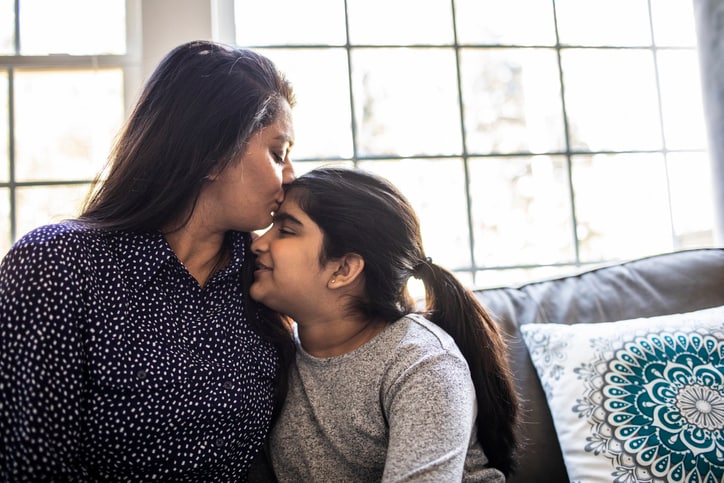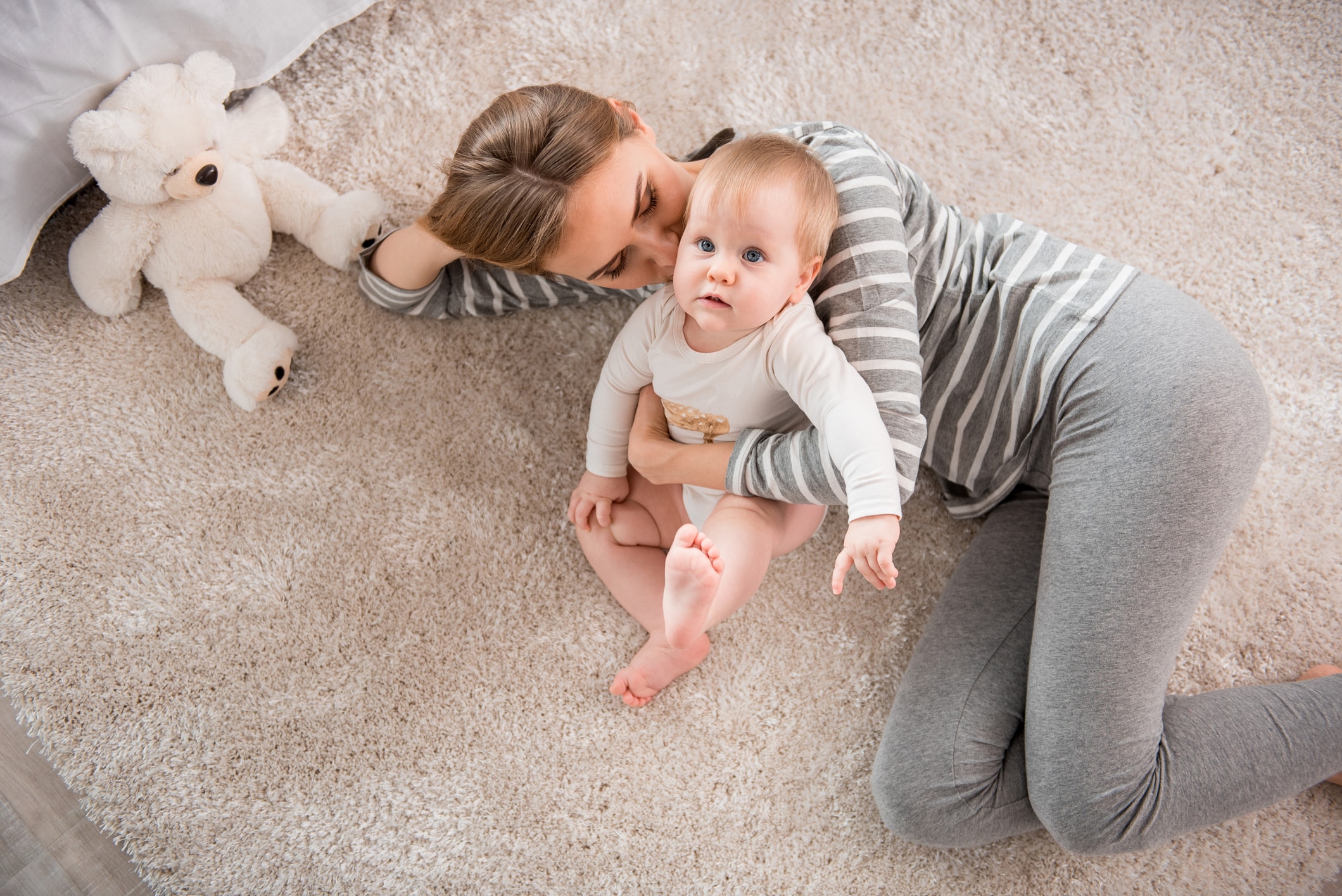In this article
- What is gentle parenting?
- What are the three C’s of gentle parenting?
- How to practice gentle parenting with tweens
- Gentle parenting responses for tweens
- Benefits of gentle parenting tweens
- Must-know gentle parenting tips for tweens from parents
- How to hold boundaries while gentle parenting a tween
- The bottom line on how to gentle parent a tween
New parents and parents looking to parent differently than they were raised have recently embraced gentle parenting as an alternative to other parenting strategies. In short, the approach encourages more conversation and collaboration between parents and their children.
Yet, most conversations about gentle parenting focus on younger children. And given that the tween years often present new physical, mental, and emotional challenges for children, parents of tweens are often searching for effective ways to deal with a child beginning to bloom into adolescence.
“At a time when children are increasingly concerned with others’ perceptions of them, gentle parenting reminds tweens to recognize what feels comfortable or forced in peer dynamics and to honor themselves and their emotions in their relationships,” explains
Dr. Cassandra Raphael, a double board-certified adult and child-adolescent psychiatrist and clinical assistant professor of psychiatry at the State University of New York Downstate Health Science Center of Brooklyn.
Key takeaways
- Gentle parenting focuses on communication, connection, and consistency, fostering trust and understanding between parents and tweens.
- It helps tweens develop independence, resilience and empathy by allowing them to express emotions and make mistakes without fear of judgment.
- While gentle parenting involves maintaining boundaries, it emphasizes being responsive and supportive rather than permissive or controlling.
What is gentle parenting?
Pediatrician Dr. Mona Amin, describes gentle parenting as “an understanding of parenting as a unit with your child by creating healthy boundaries, natural consequences, no threats, no physical harm and encouraging positive reinforcement.”
For some, gentle parenting has become a way to form a new narrative about how parents and children can relate to one another and move away from cultural stereotypes about the strict “no play approach” to parenting where parents talk at children and not with them.
“Gentle parenting emphasizes effective communication between a caregiver and a child,” says Dr. Raphael. This aspect of the approach can be especially useful for tweens.
What are the three C’s of gentle parenting?
The three C’s of gentle parenting are used to foster a sense of security and confidence in relationships between parents and children.
Connection
Parents work to stay connected to their child and their child’s individual experience.
Communication
Parents work to keep the lines of communication open through two-way conversations that build trust and understanding.
Consistency
Parents work to maintain consistency with boundaries so that children can count or a predictable response to a behavior.
“I like to use the term ‘responsive or supportive parenting’ when referring to gentle parenting, because you’re using a very responsive strategy. You’re listening to your kid, you’re hearing and understanding what’s going on with them, and you’re validating, relating and getting down to their level.”
— Francyne Zeltser, psychologist
How to practice gentle parenting with tweens
During the tween years, children become increasingly invested in relationships with their peers. “It is helpful for them to approach their new peer relationships having learned and affirmed the value of their voice at home,” Dr. Raphael explains. “Practicing effective communication allows children to also listen closely to others as they discern with whom and how they’d like to spend time.”
Brenda Codallo, a mom from Edinburg, Texas says she noticed this shift in her son, Quentin, who is in fifth grade. “The biggest change for him has been the need for acceptance,” she shares. “Before, he had his group of friends and that was fine. Now, we see his need to be popular and fit in even if he doesn’t understand what the popular things are.”
Miami-based mom Cindy Cuesta noticed a similar social change in her sixth grade son Christopher. “He brushes his hair before school and looks at himself a lot more in the mirror than he did before,” she notes.
Parents need to know there is a “push and pull” happening within tweens, points out Francyne Zeltser, a psychologist and Clinical Director of Mental Health & Testing Services at Manhattan Psychology Group in New York City. Tweens want to be independent, but they know they are still very much dependent on their parents, which makes them irritable and often prone to conflict, she points out. In turn, their frustrations often come out misdirected at parents, she explains. And in moments like these, if parents can be more responsive to their child’s behavior instead of reactive, they can better help their child feel seen and understood.
“I like to use the term ‘responsive or supportive parenting’ when referring to gentle parenting, because you’re using a very responsive strategy,” says Zeltser. “You’re listening to your kid, you’re hearing and understanding what’s going on with them, and you’re validating, relating and getting down to their level.”
She says parents who are responsive go through the experience with their child instead of the child going through the experience alone.
Zeltser gives this example: In a moment of heightened frustration, a tween yells, “You don’t understand. Just leave me alone!” Then, the child goes to their room and slams the door hard behind them. One response is to match the child’s aggression and yell at them about slamming the door or demand they open it.
“The most gentle and supportive thing a parent can do is being present and available. Often a parent’s physical presence, whether standing outside the closed door or announcing where they will be and encouraging the child to come when they feel ready, provides all the support they need,” says Zeltser.
Just as it’s important to provide support and be there for your child, it’s equally important to validate the child’s emotions and help them decide what support looks like for them. For instance, you might say, “It sounds like you’re feeling (fill in the blank emotion). Do you want to talk about this now or do you want to circle back and talk about this later?”
Zeltser explains, “It’s talking to the child and not at them. There’s a lot of communication that exists in gentle parenting that doesn’t exist in other parenting styles.”
Gentle parenting responses for tweens
Here are a few expert approved things to say to keep the lines of communication open during challenging times.
| Instead of this: | Say this: |
| Don’t slam the door! | I noticed you slammed the door behind you. What’s going on? Do you want to talk about it or do you need some alone time? |
| Don’t answer back! | I understand you want to be heard, and I want to hear what you have to say, but let’s take turns listening to one another. |
| How many times do you have to tell you to clean your room?! | How can I help you keep your room clean without having to remind you? Let’s figure out a system together. |
| What I say I goes! | Let’s discuss some options that can work for the both of us. |
Benefits of gentle parenting tweens
Here, several benefits of gentle parenting a tween, according to experts.
Both parents and children will feel secure in their relationship.
Because this approach mixes warmth, responsiveness and acceptance towards the child while holding them accountable to realistic expectations, both parent and child benefit, says Zeltser. “This parenting style leads to a secure attachment between parent and child,” she explains.
Codallo concurs. “With our son, there has been a lot more one-on-one chatting recently. Almost like mentoring sessions. He gets nurturing from Mom that a boys his age needs; and he gets the reassurance and wisdom of being a pre-adolescent boy from Dad,” she notes. “All the talks we have with him stay private, and we feel more secure, because he can now initiate conversations with no apprehension. It’s our goal to teach him how to deal with big feelings and recognize when he needs to talk through them with someone.”
“It’s our goal to teach him how to deal with big feelings and recognize when he needs to talk through them with someone.”
— Brenda Codallo, mom from Edinburg, Texas
Parents will feel more confident about their parenting.
“Parenting tweens is a balancing act between setting and holding expectations and boundaries, while providing your child with the space, support and acceptance to make their own decisions with the knowledge, resources and tools needed to make an informed decision,” says Zeltser. “It is the difference between parents being a roadmap and a GPS. Gentle parents are like roadmaps. They provide guidance without telling their children what to do and how to do it.”
Seeing how her gentle parented 11-year-old son Tadeus interacts in the world is a confidence-booster for Carol Jaime-Furaha, a homeschool mom from McKinleyville, California. “Getting the positive feedback from others that he is so kind or so independent makes me say ‘Thank God. We are doing something right,’” she notes.
Children will build resilience and empathy among other relationship-boosting skills.
“The positive, proactive approach of gentle parenting helps children learn from mistakes with less associated shame and guilt,” notes Dr. Raphael. “Gentle parenting can help a tween appreciate responsibility for their own outcomes, as well as responsibility for their belongings and those of others.”
Codallo points out that her goal is to help her son learn, which means she doesn’t want to just lecture him. “For instance, if he gets into an argument with one of his younger twin siblings, we’ll talk to him about what happened and why he didn’t let the situation go,” she explains. “We will then set up a scenario where the tables are turned to see how he would react. That has helped him feel heard and has taught him how to correct his actions.”
Kids will feel safe to express their honest feelings with their parents.
“Tweens of gentle parents are more likely to have open and honest communication with their parents as they feel supported and have a great deal of trust in their parents’ response to them,” says Zeltser.
She adds, “A gentle parent will listen to a tween’s reasoning for participating in a specific activity or engaging in a particular behavior, before passing judgment or making a decision regarding parental permission, which allows the tween to freely express their thoughts, feelings and opinions, leading to feelings of support and validation.”
Must-know gentle parenting tips for tweens from parents
If you’re thinking of raising your tween with a gentle parenting approach, consider the following advice from fellow parents already in the weeds.
Normalize mistakes
“When I make a mistake or he does (and we will make mistakes) we can both acknowledge and move forward without condemnation,” says Jaime-Furaha.
Make time for reflection
“If their attitude gets in the way of their thinking, you want them to have the time to think about what they did and what they could have done better,” notes Cuesta.
Listen
“I have learned to be a good listener,” says Cuesta. “Try not to be so critical of what they say and listen to them, so they keep talking to you. And you can create that trust.”
Be gentle with yourself
“Be gentle with yourself and remember that there is a small child within all of us that needs tenderness,” says Jaime-Furaha.
She adds, “When I myself am taking the time and making the space to set my intention first thing and seeking opportunities to grow and learn, I am receiving grace and giving it to myself. I can now present myself to my tween with a full basket and be able to extend the same gentleness to others. When my son gets frustrated or feels defeated, we effortlessly come back to center and purpose. The result is that we grow and increase in gentleness and love for ourselves and each other.”
“Knowing they have your unconditional support [and] that you will work together with them as a team to problem solve and find acceptable solutions will validate even the most uncomfortable feelings and help them feel loved and accepted.”
—Francine Zeltser
How to hold boundaries while gentle parenting a tween
Experts agree that gentle parenting isn’t permissive parenting. Tweens still need structure and a sense of accountability for their actions so they can make better choices in the future. Dr. Raphael provides four ways to help maintain boundaries while helping tweens feel seen, heard and respected.
Hold space
Your tween may request less of your time and attention as they develop new interests, she explains. “Even if those interests are changing pretty frequently, check in with them about what they are learning and doing,” advises Dr. Raphael. “Let them speak openly about their new pursuits, as a means of supporting their individuality. In connecting and communicating with the child, the parent also reinforces their own presence as a safe space for the tween.”
Foster independence and assertiveness
Encourage age-appropriate independence and assertiveness, advises Dr. Raphael. “Help them understand that independence and responsibility grow together by assigning them some household responsibilities,” she notes.
Model respect
Remember that reciprocating respect in your relationship with your child will foster their expectations for healthy relationships outside of the home.
Validate emotions
Even if they’re losing their cool over something that seems unworthy of a dramatic display, make sure you’re responding with phrases like “I hear you” or “I can see that you’re upset.” “Validate their feelings,” advises Dr. Raphael. Your job is to guide them in regulating their responses to those emotions, whether that’s encouraging them to speak kindly to themselves or take a break to meditate or go for a walk.
The bottom line on how to gentle parent a tween
Your tween may no longer resemble the little child you remember a few years before, but they can be just as emotionally fragile. They need support, love and validation. And even when you don’t get it right, remember to make time for reflection and repair.
Finally, no one has discovered the perfect way to raise a child in any age group. Experts we spoke to say the goal of gentle parenting is to make a tween or a child of any age feel they are not alone while they are experiencing feelings they may not completely understand. As Zeltser says, “Knowing they have your unconditional support [and] that you will work together with them as a team to problem solve and find acceptable solutions will validate even the most uncomfortable feelings and help them feel loved and accepted.”





